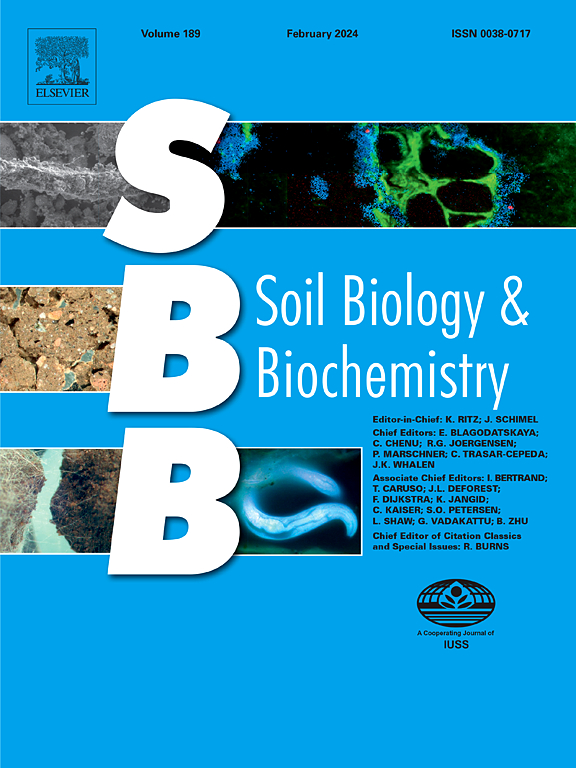部分肥料替代对土壤氮氧化物排放的不同影响取决于磷的有效性
IF 10.3
1区 农林科学
Q1 SOIL SCIENCE
引用次数: 0
摘要
粪肥替代越来越被提倡作为一种可持续施肥策略,以减少农业中合成氮的投入,尽管其对温室气体排放,特别是氧化亚氮(N2O)的影响仍不确定。在磷(P)缺乏普遍存在的亚热带地区,在营养不平衡的条件下,粪便替代在减少N2O排放方面的有效性尚不清楚。本研究利用21年施肥试验收集的土壤,采用15N示踪技术进行受控实验室孵育,研究在两种施肥制度下,部分肥料替代(用肥料氮代替30%的合成氮)对N2O排放的影响:纯氮(N, 110 kg N ha−1年−1)和氮加磷(NP, 110 kg N ha−1年−1 + 30 kg P ha−1年−1)。研究结果表明,在纯氮处理下,粪肥替代增加了30%的N2O排放,而在NP处理下减少了22%的N2O排放。这些差异响应与总氮转化过程的变化密切相关。在单氮条件下,粪肥替代刺激了自养硝化和反硝化速率,导致N2O产量增加。相反,在NP条件下,尽管异养硝化速率不变,但粪便替代主要通过降低异养硝化对总N2O通量的贡献来减少N2O排放。这种减少与nosZ进化枝II基因的显著富集一致。总体而言,这些发现表明,粪肥替代对N2O排放的影响高度依赖于环境,磷有效性是亚热带终极土壤微生物氮转化途径的关键调节因子,从而调节N2O对有机施肥的响应方向和幅度。本文章由计算机程序翻译,如有差异,请以英文原文为准。
Divergent impacts of partial manure substitution on soil nitrous oxide emissions dependent on phosphorus availability
Manure substitution is increasingly advocated as a sustainable fertilization strategy to reduce synthetic nitrogen inputs in agriculture, although its implications for greenhouse gas emissions, particularly nitrous oxide (N2O), remain uncertain. In subtropical regions, where phosphorus (P) deficiency is common, the effectiveness of manure substitution in mitigating N2O emissions under nutrient-imbalanced conditions is poorly understood. Here, we used soils collected from a 21-year fertilization experiment and conducted controlled laboratory incubations with 15N tracing techniques to examine the effects of partial manure substitution (replacing 30 % of synthetic nitrogen with manure-nitrogen) on N2O emissions under two fertilization regimes: nitrogen-only (N, 110 kg N ha−1 yr−1) and nitrogen-plus-phosphorus (NP, 110 kg N ha−1 yr−1 + 30 kg P ha−1 yr−1). Our results revealed that manure substitution increased N2O emissions by 30 % under the N-only regime, but decreased emissions by 22 % under the NP regime. These contrasting responses were closely associated with changes in gross nitrogen transformation processes. Under N-only conditions, manure substitution stimulated autotrophic nitrification and denitrification rates, leading to increased N2O production. Conversely, under NP conditions, manure substitution reduced N2O emissions primarily by lowering the contribution of heterotrophic nitrification to total N2O flux, despite unchanged heterotrophic nitrification rates. This reduction coincided with significant enrichment of nosZ clade II genes. Overall, these findings suggest that the effect of manure substitution on N2O emissions is highly context dependent, with P availability acting as a key regulator of microbial nitrogen transformation pathways and thereby modulating the direction and magnitude of N2O responses to organic fertilization in subtropical Ultisols.
求助全文
通过发布文献求助,成功后即可免费获取论文全文。
去求助
来源期刊

Soil Biology & Biochemistry
农林科学-土壤科学
CiteScore
16.90
自引率
9.30%
发文量
312
审稿时长
49 days
期刊介绍:
Soil Biology & Biochemistry publishes original research articles of international significance focusing on biological processes in soil and their applications to soil and environmental quality. Major topics include the ecology and biochemical processes of soil organisms, their effects on the environment, and interactions with plants. The journal also welcomes state-of-the-art reviews and discussions on contemporary research in soil biology and biochemistry.
 求助内容:
求助内容: 应助结果提醒方式:
应助结果提醒方式:


